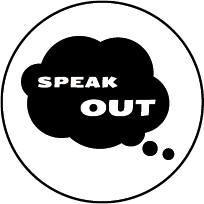What can you do?
Speak out!
Why don't children ask for help?
Statistics from 2018 show that only 20% of cases of school bullying are reported. Children do not report bullying to adults for many reasons:
- Bullying can make you feel helpless. You might want to handle it on your own to feel like you have control.
- You may be afraid of being seen as weak or a tattletale.
- You may be afraid of the aggressor's reaction.
- Bullying can be a humiliating experience. You may not want adults to know what’s being said about you, whether it’s true or not. You might also fear being judged or punished by adults for being weak.
- If you are the bullied child, you may already feel socially isolated. You might think no one cares or that no one would understand.
- You might be afraid of being rejected by your peers. Friends may be helping protect you from bullying, and you may fear losing this support if everything becomes public and those who helped you start fearing too.
What can you do about it?
- How to defend yourself at the beginning?
You need to have self-respect—don't let things slide. Respond assertively to insults: “You're an idiot.” – “Thanks for telling me that.” Use the right body language. Stand tall; don’t look away!
Of course, if the bullying escalates, it's necessary to talk about it and ask for help.
- How to behave when you don't know what to do?
The most important thing to know is this: You must speak out!
Confide in someone! Ideally, your parents or a teacher you trust, or another trusted adult, such as a coach, grandparent, older sibling... If you can’t, call the helpline—116 111 (free of charge).
Parents are the most interested in helping you, and teachers have experience and procedures to safely and quickly solve the situation. Your school is required to have a prevention coordinator or a school counselor. Every school should have a contact to turn to. The school is obligated to address every reported case of bullying and protect you!
Show these websites to your parents; they have here a clear procedure to follow.
- How to behave when you are a witness to bullying?
When someone is experiencing violence, it’s important not to remain silent. It’s not tattling or snitching; it’s heroism. Don’t be passive; you might need such support yourself one day! The worst thing is to do nothing and hence to remain indifferent to the bullying!
"Closing our eyes against evil puts us on its side!"
- How to stop cyberbullying?
The internet and social media are public platforms accessible to children of all ages.
If you are bullied in any way through social media platforms, do not respond to the aggressor, block them, report the incident to the service provider, keep evidence, and confide in a close person!
Furthermore, be cautious of the privacy that you have on social media: know if your posts and comments are public or private, and be cautious of who you communicate with.
- How to proceed when I’m a parent and my child confides in me about bullying?
Since there are usually multiple aggressors, it is not appropriate to seek out the aggressor or their parents and try to talk to them. This might work if there is one aggressor and one victim, and the aggressor’s parents will accept everything, but often they don’t believe it, deny the act, or are unwilling to help resolve the circumstance.
- Contact the school Visit the class teacher or the school principal in person. This is the first step you, as parents, should take, even if it concerns cyberbullying that can occur outside of school. It is also helpful to try and assess the stage of the bullying (see the section on the phases of bullying). In the early stages, the situation can be safely and effectively addressed if the school has the sufficient instruction of its staff.
PhDr. Michal Kolář advises parents to be prepared for three possibilities:
- The school knows how to address bullying. This is the ideal situation. Some schools have detailed instructions on their website for parents on what to do and how the bullying issue will be handled.
- The school shows interest but doesn't know how to proceed. This is a fairly common situation. In this case, with the help of an external expert, you will search for a suitable solution.
- The most common and least favorable situation. The school cannot or will not address bullying. Often, schools refuse to address and resolve bullying if it threatens their credibility. In such cases, they inadequately handle situations, settling with the solutions that least harm the school's reputation. "Even if parents go to school, the school often reacts defensively rather than professionally. It denies the bullying or merely reassures the parents that they will keep an eye on the situation," says the psychotherapist and bullying expert PhDr. Michal Kolář. In such cases, parents should refer to the Ministry of Education’s guidelines, which clearly outline the steps to be taken.
Schools have had updated guidelines from the Ministry of Education since 2001, which support them in this area.
A school-appointed and trained educator for prevention and solving bullying (usually the prevention coordinator or school counselor) should be able to manage initial bullying—the first, second, and sometimes even the third stages, when there are still appropriate witnesses and students willing to cooperate and when the bullying is not yet driven by the core group of aggressors. If needed, the school will turn to external experts," states the guidelines.
When parents come asking for help with their child’s bullying, the teacher should not react defensively or with doubt. "They should not downplay the situation by claiming that the child provoked it, or that it was just teasing, etc. Parents should be calmly listened to, allowed to explain, not lectured, and actively listened to. It’s important to ask the right questions to receive crucial information from those involved. Any suspicion or claim that their child is being bullied should never be underestimated, and the situation needs to be thoroughly and safely investigated," the Ministry warns.
-
Transfer to another school If the school still refuses to address the bullying, try to arrange a transfer to another school. For the child, it could be a lifesaver. According to PhDr. Kolář, this is a common but unfavorable solution to the bullying problem, as the aggressors will simply find another victim. It is, therefore, necessary for schools and their staff to be as involved as possible in anti-bullying programs. "The mistake of teachers or principals is not that bullying happens in their school, but that they refuse to do anything about it," Kolář emphasizes.
-
Inform the school authority or inspectorate If you cannot find a solution with the school administration, contact the relevant school authority or the school inspectorate.
-
Contact the police In many cases, bullying is also a criminal offense. "Bullying can constitute criminal offenses such as restricting personal freedom, theft, bodily harm, property damage, blackmail, robbery, racially motivated acts, rape, and sexual abuse," states the Czech Department of Police. Therefore, it’s appropriate to contact the nearest police station. If the aggressor is under 15 years old, they are not criminally responsible, but the juvenile court can impose certain recommendations under the law, such as probation supervision, placement in a therapeutic, psychological, or other suitable educational program in care facilities, or protective upbringing. The criminal responsibility of minors (15-18 years old) is judged by juvenile courts, where criminal proceedings are conducted.
How to recognize that your child is a victim of bullying if they don't confide in you?
It often happens that a bullied child does not talk about their problems at home. If they do, it’s certainly a positive sign. However, if your child says nothing, certain warning signs may suggest the terror they are experiencing at school or on their way to/from school. According to Michal Kolář, parents should be cautious of the following signs:
- No classmates or friends come home with the child.
- The child has no friend to spend their free time with or talk on the phone with.
- The child is not invited to visit other children.
- The child is reluctant to go to school (especially if they used to like school).
- The child delays leaving the house or shows signs of fear.
- Loss of appetite.
- The child does not take the shortest route to school or from school, may switch routes, or ask for a ride by car.
- The child comes home hungry (aggressors take their snack or lunch money).
- They fall asleep crying, have restless sleep, or cry out in their sleep, e.g., "Leave me alone!"
- The child loses interest in studying and has difficulty concentrating.
- The child becomes sad, apathetic, or exhibits mood swings.
- Mention of possible suicide.
- Refusal to talk about what’s bothering them.
- The child asks for money and gives dubious excuses (e.g., repeatedly saying it was lost) or steals money at home.
- The child often reports missing personal belongings.
- The child becomes unusually aggressive toward siblings or other children, possibly showing anger toward parents.
- The child complains of vague stomach or headache pain, possibly vomiting in the morning, trying to stay home.
- They may exaggerate their health issues or manipulate a thermometer, etc.
- The child avoids going to school.
- The child stays home more than usual.
If you observe any of these signs in your child, try to find out if something is really going on. Calmly talk to your child and try to open the topic. Very often, you will succeed in getting your child to talk. And you should definitely be supportive at that moment. "It’s terrible when the child finally speaks, and the parents refuse to listen. They might say, 'Deal with it yourself.' That proposition hurts the child, however. In instances of bullying, there is typically an imbalance, and the child has no chance of defending themselves. You must believe your child and help them," warns Michal Kolář.






